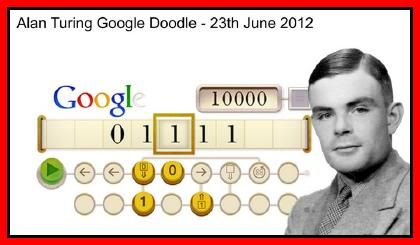Thank You Alan Turing For Making Today's Post Possible
The Strange Life and Death of Dr Turing
Click Here To See The Full Part One Video On Youtube
 Alan Turing: Inquest's suicide verdict 'not supportable'
Alan Turing: Inquest's suicide verdict 'not supportable'By Roland Pease BBC Radio Science Unit
Alan Turing, the British mathematical genius and codebreaker born 100 years ago on 23 June, may not have committed suicide, as is widely believed.
At a conference in Oxford on Saturday, Turing expert Prof Jack Copeland will question the evidence that was presented at the 1954 inquest.
He believes the evidence would not today be accepted as sufficient to establish a suicide verdict.
Indeed, he argues, Turing's death may equally probably have been an accident.
What is well known and accepted is that Alan Turing died of cyanide poisoning.
His housekeeper famously found the 41-year-old mathematician dead in his bed, with a half-eaten apple on his bedside table.
It is widely said that Turing had been haunted by the story of the poisoned apple in the fairy tale of Snow White and the Seven Dwarfs, and had resorted to the same desperate measure to end the persecution he was suffering as a result of his homosexuality.
But according to Prof Copeland, it was Turing's habit to take an apple at bedtime, and that it was quite usual for him not to finish it; the half-eaten remains found near his body cannot be seen as an indication of a deliberate act.
Indeed, the police never tested the apple for the presence of cyanide.
Moreover, Prof Copeland emphasises, a coroner these days would demand evidence of pre-meditation before announcing a verdict of suicide, yet nothing in the accounts of Turing's last days suggest he was in anything but a cheerful mood.
Continue reading the main story
“Start Quote
We have... been recreating the narrative of Turing's life, and we have recreated him as an unhappy young man who committed suicide. But the evidence is not there”
Prof Jack Copeland University of Canterbury, Christchurch, New Zealand
Alan Turing's genius
He had left a note on his office desk, as was his practice, the previous Friday to remind himself of the tasks to be done on his return after the Bank Holiday weekend.
Nevertheless, at the inquest, the coroner, Mr JAK Ferns declared: "In a man of his type, one never knows what his mental processes are going to do next." What he meant by "of this type" is unclear.
The motive for suicide is easy to imagine. In 1952, after he had reported a petty burglary, Turing found himself being investigated for "acts of gross indecency" after he revealed he had had a male lover in his house.
Faced with the prospect of imprisonment, and perhaps with it the loss of the mathematics post he held at Manchester University, which gave him access to one of the world's only computers, Turing accepted the alternative of "chemical castration" - hormone treatment that was supposed to suppress his sexual urges. http://www.bbc.co.uk/news/science-environment-18561092
Conviction for indecency
In January 1952, Turing met a man called Arnold Murray outside a cinema in Manchester. After a lunch date, Turing invited Murray to spend the weekend with him at his house, an invitation which Murray accepted although he did not show up. The pair met again in Manchester the following Monday, when Murray agreed to accompany Turing to the latter's house. A few weeks later Murray visited Turing's house again, and apparently spent the night there.
After Murray helped an accomplice to break into his house, Turing reported the crime to the police. During the investigation, Turing acknowledged a sexual relationship with Murray. Homosexual acts were illegal in the United Kingdom at that time, and so both were charged with gross indecency under Section 11 of the Criminal Law Amendment Act 1885.
Turing was given a choice between imprisonment or probation conditional on his agreement to undergo hormonal treatment designed to reduce libido. He accepted chemical castration via injections of stilboestrol, a synthetic oestrogen hormone.
Turing's conviction led to the removal of his security clearance, and barred him from continuing with his cryptographic consultancy for the Government Communications Headquarters (GCHQ), the British signals intelligence agency that had evolved from GCCS in 1946. At the time, there was acute public anxiety about spies and homosexual entrapment by Soviet agents, because of the recent exposure of the first two members of the Cambridge Five, Guy Burgess and Donald Maclean, as KGB double agents. Turing was never accused of espionage but, as with all who had worked at Bletchley Park, was prevented from discussing his war work. http://en.wikipedia.org/wiki/Alan_Turing
 thinkingblue
thinkingblueLabels: 100, alan turing, birthday, computer, Homosexuality, injustice, mathematics, political, Science, UK







<< Home